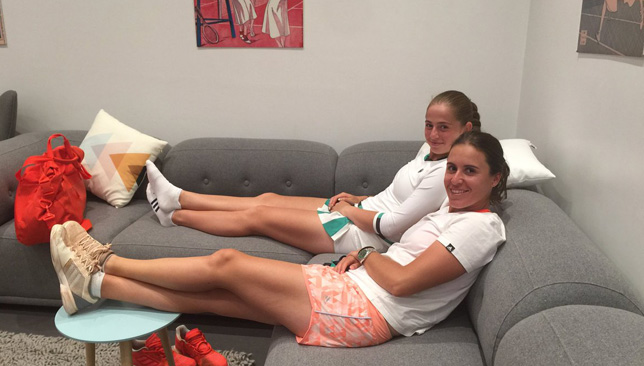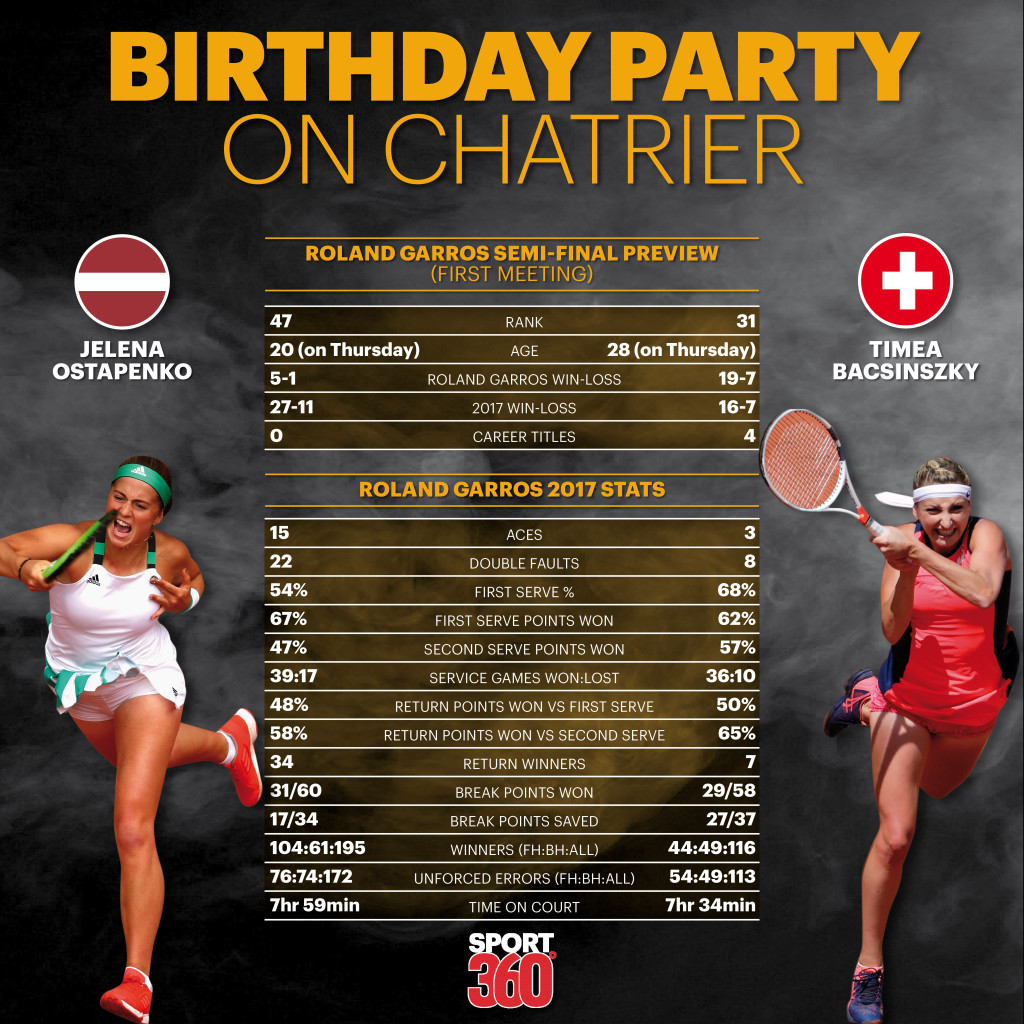
A short while after Jelena Ostapenko reached her maiden Grand Slam semi-final with a win over Caroline Wozniacki at Roland Garros on Tuesday, ex-Wimbledon champion Marion Bartoli went to congratulate the Latvian teenager’s coach Anabel Medina. She hugged her while calling her, “Trainer of the year”.
Bartoli is not wrong.
Medina and Ostapenko, who turns 20 on Thursday, only began working together at the start of the clay season in Stuttgart, end of April, and the Spanish ex-world No16 has already helped guide the talented youngster to her first Major semi-final.
Clay is not Ostapenko’s favourite surface but with Medina, the aggressive youngster has managed to accumulate a 14-3 win-loss record (including qualifying) so far on the red dirt.
Ostapenko, who was the Wimbledon junior champion in 2014, lost in the opening round at all four Slams last year but is now one of the last four women standing at Roland Garros, where she is making only her second main draw appearance.
Her win over Wozniacki on a rainy, windy Tuesday in Paris has made her the first Latvian woman to ever reach a Grand Slam semi-final and she will take on No30 seed Timea Bacsinszky on Thursday for a place in the final.

Ostapenko, ranked No47 in the world, is a force of nature on court. She is erratic, explosive, and tough to handle when she is on top of her game. So far this fortnight, she has fired a total of 195 winners across five matches.
She has a lot of power and Medina says harnessing it has been one of the first things they’ve worked on together.
The pair first teamed up in the preseason of 2015. They share the same agent – Ugo Colombini – who suggested Ostapenko go to Valencia for a couple of weeks to train with Medina.
They couldn’t continue because Medina was still playing doubles on tour and Ostapenko needed someone full-time but a shoulder injury that stopped the Spaniard from competing led to another brief stint together in the Asian swing last fall.
After Asia, Ostapenko got back to training with her mother, Jeļena Jakovļeva, but when she saw Medina helping Silvia Soler Espinosa in Dubai and Doha last February, she asked her if she could help her during the clay season.
“I think it works because she likes to work with women because she’s been working with her mother and her fitness coach is also a woman,” Medina, a former world No3 in doubles, told Sport360.
“She’s very talented but I think she needed to be a little more organised on the court because she was playing too much free.
“I tried to tell her a little bit ‘okay if you’re in this situation maybe it’s better to do this way’. But of course I didn’t touch anything in her game because she’s playing very aggressive and she has to keep doing this because that’s the modern tennis being played right now.
“But yes a little bit organised, working a little bit with the serve. I’m very very very happy because I feel that she listens to me a lot and that she believes what we’re talking about. That makes me feel, as a coach, very happy, because sometimes you cannot reach the player but with her, since we started in Stuttgart, she has started to know me much better and has got more confidence (in me).”
Ostapenko Party 🎉
— Roland-Garros (@rolandgarros) June 7, 2017
Watch highlights from the Latvian teen's QF win over Wozniacki & see why she could go all the way. #RG17 pic.twitter.com/W5C90d7kZI
Ostapenko is someone who exudes youth and enthusiasm. She grew up taking dance classes and took part in ballroom dancing competitions and says she still practices just for fun.
Her favourite dance? “The Samba,” she says with a laugh because she likes the songs suitable for it.
Her dance background can explain her swift footwork on an incredibly windy day in Paris on Tuesday. It sure comes in handy.
She is the youngest to reach the semi-finals at the French Open in a decade and while she is the least experienced of all the semi-finalists taking to the court on Thursday, Medina believes Ostapenko’s youth can also be an advantage.
“Of course everybody says that when you are young you aren’t thinking too much, in this case for her for sure it helps because she’s like more free,” said the 34-year-old Medina. “During one of the rain delays (on Tuesday) she said ‘I’m young, I have nothing to lose, I have a lot of Roland Garros to play so I’m going to play free’ and that’s a very good mentality that she thinks that and just goes on the court and just plays free.
“I think she’s got a little bit of advantage in this case.”
After playing mix with me I think Ostapenko was hit by the #lendleffect
— Bruno Soares (@BrunoSoares82) June 7, 2017
Ostapenko speaks in bite-sized answers but there’s a big, fun personality hiding behind her curt responses in press conferences.
She’s the second-youngest player in the top 47 and believes we could be witnessing a changing of the guard soon in the women’s game.
“Our year, 1997, is pretty strong because we have a lot of players in top 100 and top 50, as well. So I think it’s maybe kind of new generation,” says Ostapenko, who is yet to win a title but made the Charleston final on green clay in April and has made two previous finals in Doha and Quebec City over the last two years.
Medina says it’s surprising Ostapenko has had her first Grand Slam breakthrough on the clay of Roland Garros but that her charge has been training with the mindset of making deep runs at the Majors in general.
“Of course when I came here I didn’t expect I’m going to be in the semis, but I was playing better and better every match. So I think if I keep it up, I think anything can happen,” says Ostapenko, who took out No11 seed Wozniacki, former runner-up Sam Stosur and Olympic champion Monica Puig en route to the semis. .
Ostapenko and her semi-final opponent, Bacsinszky, will both be celebrating their birthdays on Thursday in a funny yet bizarre coincidence. The Swiss No30 seed is eight years older.
It will be their first match against one another with Bacsinszky having experience on her side with this being her second Roland Garros semi-final in three years.
Medina believes in Ostapenko’s chances though.
“I think everybody knows that she has this talent and that she could be in these rounds at a Grand Slam. Maybe it came very early, or maybe not, but I think she worked to be in the semi-finals – she didn’t have any retirements, she was one set down against some opponents, she fought hard to be in the semi-finals every match, so I think she deserves this. And she has the mentality to go for it,” said the Spanish coach.
Un momento precioso ☺️ para el recuerdo. 👐🏼 Ostapenko 👐🏼 😊
— Anabel Medina (@anabelmedina) June 6, 2017
🔜 Semis de @rolandgarros! 💪🏼 pic.twitter.com/Dmm8kgxAHJ
Medina, who reached the fourth round at Roland Garros in singles in 2007 and won the title twice in doubles in 2008 and 2009, is enjoying her life as a coach so far.
“I think when I was playing I was the kind of player who was very nervous, I suffered a lot, and I couldn’t do my best tennis because of the tension,” she confessed.
“So I think the difference now as a coach is that being outside of the court, is that you can see everything like more open and you see things much more clearly than when you are on the court. So I think I can help a player a lot because of this open view. I’m really enjoying it. I’m a rookie (smiles) but I’m enjoying it.”
She maybe a “rookie” but she’s having one of the best possible rookie starts anyone could hope for.
Medina and Ostapenko are yet to discuss their partnership post-Roland Garros but it’s fair to expect the Latvian would want to continue.